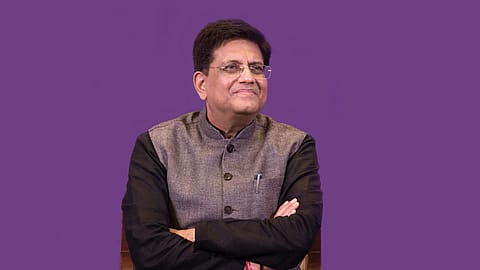Piyush Goyal urges auto industry to focus on inorganic growth
The government will come out with the guidelines for National Research Foundation where ₹1 lakh crore has been allocated for supporting public-private-academia partnerships on R&D, Piyush Goyal

Union minister of commerce and industry Piyush Goyal on Monday exhorted the auto industry companies to combine their organic growth with a certain amount of inorganic outreach across the world as that would help India to get access to some “enviable” technologies.
“I received a message about a week ago. A very large German company, as a matter of respect I will not take the name, has possibly gone down to zero value in the stock market. The gentleman who sent me that message was urging me that India needs to buy it off, saying why doesn’t the government or some of its companies buy it off?” Goyal says at the ACMA 64th Annual Session, recalling the opportunity to buy a large German carmaker.
“Government will not be in a position to take a decision overnight and assess the pros and cons, negotiate value with the German government. But any one of you can possibly do that from the private sector. But with that company will come large amount of enviable technologies which India could do wonders with,” he explains.
The same must be happening in different parts of the world in the auto component sector, the tyres sector and various other industries, he says.
The Union minister says the government is soon going to come out with the guidelines for NRF – National Research Foundation - where ₹1 lakh crore has been allocated for supporting public-private academia partnerships to do R&D for different industries.
The auto industry must look at capturing the opportunities the world has to offer particularly in new technologies, says Goyal. “Let’s not look at small ambitions, let’s be big in our dreams,” he adds.
“If we look at our agreements with EFTA (European Free Trade Association countries) – Switzerland, Norway, Iceland and Liechtenstein. They have committed to put in $100 billion in India. They don’t have much manufacturing in those four countries but they do have some technologies. They would be interested in investing in India,” he says.
Recommended Stories
Many of India’s component manufacturers still import their inputs from Korea, Taiwan, Japan and China, Goyal says, adding that he doesn’t understand why Indian companies can’t plan to become indigenous suppliers and manufacturers.
With 1.4 billion aspirational Indians, whose incomes are on the rise, the industry will find a large market within the country, says Goyal.
The auto component industry will hit $100 billion in exports by 2030, making it one of the largest job generators in the country, says Goyal. “The government is developing 20 industrial smart cities with a complete ecosystem for manufacturing. If you want me to dedicate one or two of those to your industry I am happy to do that,” he says.
Currently, around 70% of parts in a passenger car are localised. The auto industry is looking to drive up localisation of semiconductors and battery cells in electric vehicles.
(INR CR)